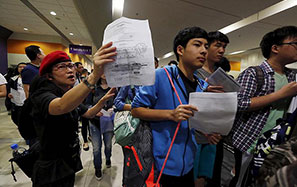Courts urged to better serve ethnic people
77 judges in Gansu are multilingual, up from fewer than 10 three years ago
China's top court said on Thursday that it will take a series of measures this year to educate more ethnic judicial talent in order to solve legal disputes in regions inhabited by ethnic groups more efficiently.
The major measures include judicial exchanges and the publication of legal materials in ethnic languages, according to a statement by the Supreme People's Court.
Under the Constitution, ethnic litigants have the right to use their language to file a lawsuit.
"We will send more judges from the highest justice chamber and courts in developed cities to western regions, while welcoming those from areas inhabited by ethnic groups to eastern regions to educate them on case hearings," said Xu Jiaxin, director of the SPC's political department.
The exchange will help narrow the gap in legal resources across the country, Xu said.
Meanwhile, the top court plans to publish legal materials-such as law dictionaries and judicial interpretations-in ethnic languages later this year, the statement said.
"We want to increase the number of people who can provide legal services for ethnic litigants and ensure access to justice in regions inhabited by ethnic groups," Xu said.
In 2015, the top court launched a project to train 1,500 judges to speak ethnic languages by 2020, "and we've made further efforts since then", he said.
Last year, for example, the top court went to the Tibet autonomous region to provide training sessions to more than 1,500 local judges and cooperated with three colleges, including Minzu University of China, to educate ethnic students on law.
"Dealing with cases in ethnic languages will ensure ethnic litigants can better understand laws and accept verdicts. Moreover, it's a way of protecting their rights," Xu said.
He Zijun, a judge from Northwest China's Gansu province, where the ethnic population is about 2.4 million, said that the number of people who can hear cases and translate legal documents in ethnic languages increased to 77 last year, compared with fewer than 10 three years ago.
"Judges in our province have received a total of 74 training sessions on how to speak Mongolian and Tibetan languages, which helps them to communicate with ethnic litigants," He said.
In the past, some Tibetan litigants mistook a suspended death sentence to mean the release of a defendant, because the legal jargon has no equivalent wording in their language, he said.
"The language barrier made it difficult to communicate and state facts clearly during case hearings," he added.
However, after learning some Tibetan languages in the training sessions, "it's easier for us to explain verdicts to Tibetans and to solve their disputes", he added.

























